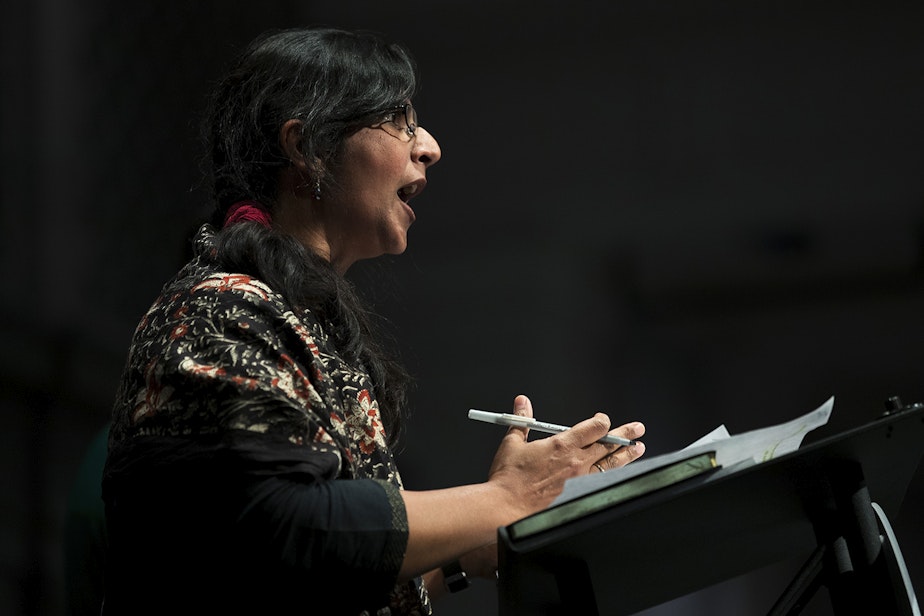Friday Politics: Argument over recalling Seattle CM Sawant and Mayor Durkan

Recall efforts against Seattle City Councilmember Kshama Sawant and Mayor Jenny Durkan are moving forward.
A judge ruled this week that allegations against Sawant could be considered, including one that she violated the law by letting demonstrators protesting police violence into the City Hall after hours, during the pandemic.
Political analysts Joni Balter, host of the Seattle Channel’s “Civic Cocktail,” and C.R. Douglas of Q13 News spoke with KUOW’s Angela King -- and disagreed over the value of recalls.
Joni Balter: We all know that this is an angry, difficult time for a lot of people. We have been cooped up first from coronavirus, now smoke. Many people are riled up about police issues. Politicians are caught in so many heated debates. Recalls are tough and they should be. Elections, in my mind, are the place where you settle up with elected officials. That said, the recall of Durkan is really poorly timed because it would occur in the same year as a re-election attempt. Sawant has three more years left in her term, so you could say there's more to that. Still voters in Seattle's 3rd District knew her very well when they re-elected her last fall. So they really cannot be surprised that she governs more like an activist than a reasonable council member. I'm against both recalls. To me they both reflect extreme politics.
C.R. Douglas: Well, I actually want to stick up for the concept of recalls. I mean, yes, we have elections, but recalls are by their nature, about new allegations and new information that that come up after an election. So theoretically, it shouldn't really matter how recent the last vote was. And I don't think it should really matter for recall how soon the next election is. Why can't a recall be the same year as a politician is up for reelection? I mean, if the behavior is questionable enough, then it seems a recall should happen. If and when that surfaces I mean, I think recalls and the threat of recalls are important. They're an important accountability tool. The timing of them will probably be never perfect, but you kind of have to live with that unless you want to abandon them altogether.
Angela King: What do you make the Seattle City Council voted -- seven to one -- to fund salons legal defenses? I think the estimates are around $75,000.
Douglas: Well, I was surprised when I read that headline, but actually, when you dig into it, it does make sense. The history is that the city has paid legal expenses when council members are in hot water, including fighting the recall. They paid for former Councilmember Richard Conlin’s recall defense several years ago. So for official acts where lawyers are needed, it does seem to be the case that the city picks up the tab.
Even Sawant’s most consistent adversary on the council, Alex Pedersen, voted to fund her defense, and he probably supports the recall effort against her. So that tells you that this is basically standard operating procedure.
Sponsored
Balter: It is very much a "there but for the grace of God go I" kind of situation. It's true that many council members really dislike Sawant. She is not easy on people. But these council members realize they might need the same support someday themselves. And also many of them rightly feel that the voters spoke less than a year ago about Sawant and that vote should mean something.
King: We're going to switch gears to another story -- the gubernatorial debate on October 7. It's sponsored by the Washington State Debate Coalition led by Seattle CityClub.
Balter: I work with CityClub, but I have absolutely nothing to do with the debates. There is always a debate about the debates. This year it was about coronavirus, because it was largely about mask wearing and social distancing. Democratic incumbent Governor Jay Inslee, correctly in my mind, didn't want to sit in the same room with an avowed anti-masker. That's his opponent, Republican Loren Culp. The solution they've come up with: two candidates in two different rooms at TVW in Olympia. Inslee cannot be seen modeling poor mask etiquette. He advocates for masks all the time, every time you see him. And since Culp has made such a huge deal of not wearing a mask, he can't be seen, I guess, wearing a mask.
King: So C.R., who's got the advantage in this?
Douglas: It definitely puts Lauren Culp at a disadvantage. He didn't want this format. He wanted to be in the same room, and he's the guy who's way behind. He's the one that needs a game-changing debate if he's going to have any chance in this race, and I just don't see how he's going to get that if he's not closer to the governor.




